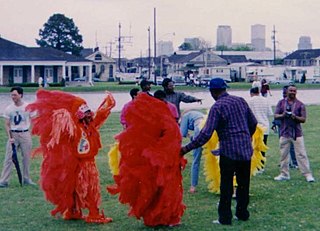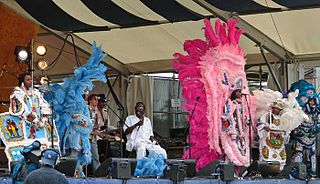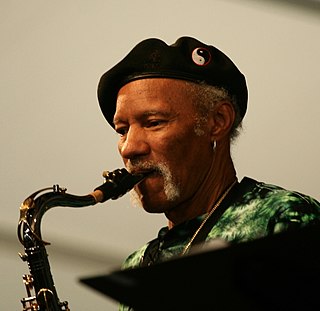Related Research Articles

The Meters are an American funk band formed in 1965 in New Orleans by Zigaboo Modeliste (drums), George Porter Jr. (bass), Leo Nocentelli (guitar) and Art Neville (keyboards). The band performed and recorded their own music from the late 1960s until 1977 and played an influential role as backing musicians for other artists, including Lee Dorsey, Robert Palmer, Dr. John, and Allen Toussaint. Their original songs "Cissy Strut" and "Look-Ka Py Py" are considered funk classics.
The Neville Brothers were an American R&B/soul/funk group, formed in 1976 in New Orleans, Louisiana.

Mardi Gras Indians are African American carnival revelers in New Orleans, Louisiana, who dress up for Mardi Gras in suits influenced by Native American ceremonial apparel.

Allen Richard Toussaint was an American musician, songwriter, arranger, and record producer. He was an influential figure in New Orleans rhythm and blues from the 1950s to the end of the century, described as "one of popular music's great backroom figures." Many musicians recorded Toussaint's compositions. He was a producer for hundreds of recordings: the best known are "Right Place, Wrong Time", by longtime friend Dr. John, and "Lady Marmalade" by Labelle.

Aaron Joseph Neville is an American R&B and soul singer. He has had four platinum albums and four Top 10 hits in the United States, including three that reached number one on Billboard's Adult Contemporary chart. "Tell It Like It Is", from 1966, also reached the top position on the Soul chart for five weeks.
Galactic is an American funk band from New Orleans, Louisiana.
The Jefferson City Buzzards are the oldest marching club in New Orleans Mardi Gras. The club was founded in 1890. Named after the former New Orleans municipality of Jefferson City, the Buzzards have an all-male membership and are headquartered at 5215 Annunciation Street.

The Wild Tchoupitoulas is a 1976 album by the New Orleans Mardi Gras Indian tribe the Wild Tchoupitoulas. While not a commercial success, the effort was well received critically and the experience recording it encouraged the four Neville brothers to perform together for the first time as a group.

Arthur Lanon Neville Jr. was an American singer, songwriter and keyboardist from New Orleans.
Huey Pierce "Piano" Smith was an American R&B pianist whose sound was influential in the development of rock and roll.

"Big Chief" Monk Boudreaux is an African-American musician and Big Chief of the Golden Eagles, a Mardi Gras Indian tribe. He is widely known for his long-time collaboration with Big Chief Bo Dollis in The Wild Magnolias.

Always for Pleasure is a 1978 documentary film by Les Blank about social traditions in New Orleans, Louisiana.

"Mardi Gras Mambo" is a Mardi Gras-themed song written by Frankie Adams and Lou Welsch. The song's best known version was recorded in 1954 by the Hawketts, whose membership included Art Neville, a founding member of the Meters and the Neville Brothers. It is one of the iconic songs frequently played during the New Orleans Mardi Gras.

The Wild Magnolias are a Mardi Gras Indian tribe who also record and play as a funk musical act from New Orleans, Louisiana.
"Big Chief" is a song composed by Earl King in the early 1960s. It became a hit in New Orleans for Professor Longhair in 1964, featuring a whistled first chorus in a rollicking blues piano style and subsequent lyrics written in mock-American-Indian pidgin. The tune became popular in New Orleans, frequently performed by local musicians such as Dr. John, and is now a staple of the repertory of most brass bands and musicians in the area.

Charles Neville was an American R&B and jazz musician best known as part of The Neville Brothers. Known onstage as "Charlie the horn man", his saxophone playing helped earn the group a Grammy Award for best pop instrumental performance.
The Hawketts were an American R&B combo from New Orleans, Louisiana who are best known for their 1954 recording of "Mardi Gras Mambo", a song that has become an iconic classic of the New Orleans Carnival celebration.
Cha Wa is a Grammy-nominated Mardi Gras Indian funk band based out of New Orleans, Louisiana. The name Cha Wa is a slang phrase used by Mardi Gras Indian tribes, meaning "we're comin' for ya" or "here we come." Frontman Honey Bannister is known for dressing in traditional Mardi Gras Indian clothing during performances, including intricately designed headdresses.

"Scarface" John Williams was an American R&B singer and Mardi Gras Indian. He performed with the New Orleans band Huey "Piano" Smith and the Clowns.
References
- ↑ Faber, Jim (2017-07-19). "'Buried history': unearthing the influence of Native Americans on rock'n'roll". The Guardian . Retrieved 2017-11-09.
- ↑ "T-c-h-o-u-p-i-t-o-u-l-a-s". Tchoup Industries. Retrieved 2019-01-27.
- ↑ The Neville Brothers
- ↑ Louisiana Music Factory – Wild Tchoupitoulas by Wild Tchoupitoulas Archived September 29, 2011, at the Wayback Machine
- ↑ Mardi Gras Profiles Wild Tchoupitoulas Archived May 13, 2006, at the Wayback Machine